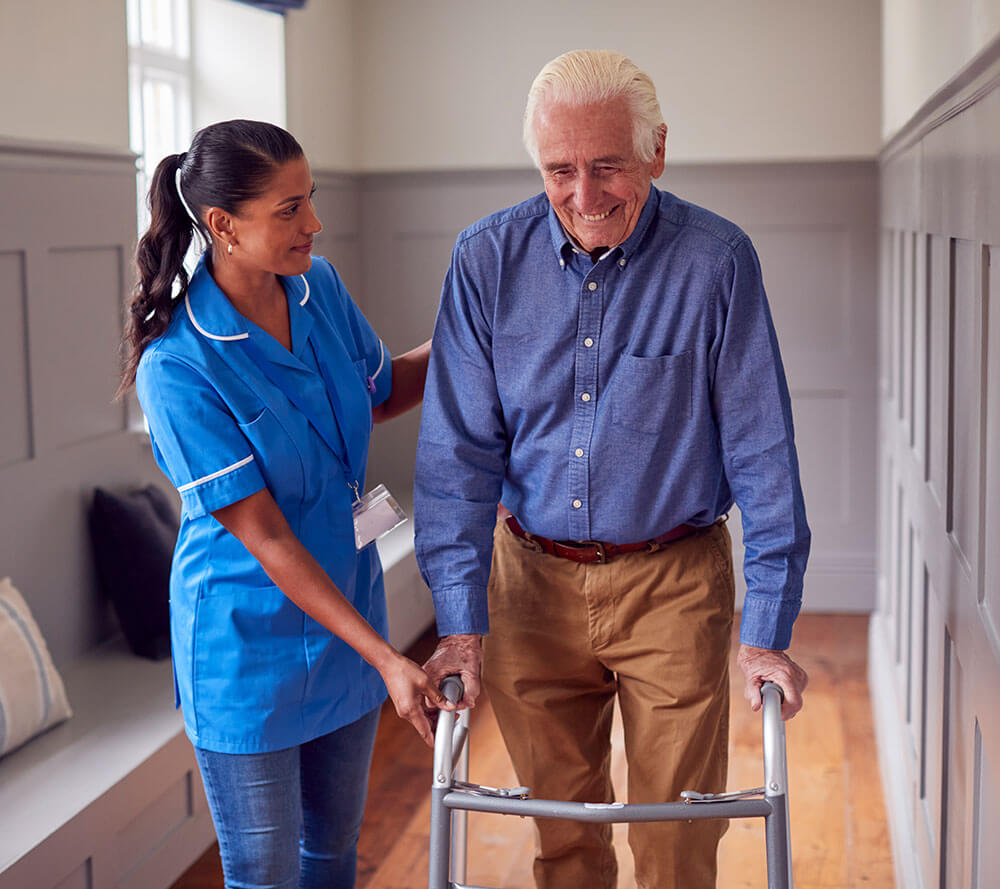Support for NHS-funded Home Care

NHS Healthcare Support
Most people have to pay something towards the care they receive. But some people with ongoing significant health needs can get their care paid for through NHS continuing healthcare.
What is NHS Healthcare Support?
NHS healthcare support is a package of care for people who are assessed as having a ‘primary health need’. It is provided and funded by the NHS.
- If you receive care in your own home the NHS covers the cost of care and support you need to meet your assessed health and associated care needs, which includes personal care such as help with washing and getting dressed.
- If you receive NHS Healthcare Support in a care home the NHS pays your care home fees.
Can I get NHS Healthcare Support?
Yes, Eligibility for NHS Healthcare Support isn’t based on whether you have a specific health condition.
To get NHS Healthcare Support you must:
- Have ongoing significant physical and/or mental health needs, and having taken account of all your needs, it can be said that the main aspects or majority part of the care you need is focused on addressing and/or preventing health needs.
How does the evaluation for eligibility for NHS Healthcare Support work?
NHS staff evaluate your health needs and decide your eligibility for NHS Healthcare Support. The process involve a number of activities.
1. We assess whether you have significant health needs, and NHS staff or a member of the Double Em Care Services social work team will carryout tests to help decide whether whether you may be eligible for NHS continuing healthcare.
These situations include:
- if Double Em Care services believe after a period of rehabilitation following a hospital stay that your condition is unlikely to improve and you have significant health needs
- Before deciding you need NHS-funded nursing care in a nursing home
- When your health or social care needs are being reviewed as part of a community care assessment
- If your physical or mental health deteriorates significantly and your current level of care seems inadequate
- When your nursing needs are being reviewed; this should happen annually if you live in a nursing home
- If you have a speedily deteriorating condition and that may be approaching the end of your life.
- Note: You should be fully involved and your views should be considered and you can ask a relative or carer to help and support you.


2. The assessment process usually starts with the completion of the Checklist tool by a nurse or a social worker trained to complete it. This identifies whether you need to have a full NHS continuing healthcare assessment.
In some situations listed above, it will be clear to health and social care staff that your needs do not indicate NHS continuing healthcare at this time. If health and care staff agree, they should record this in your notes, with their reasons. If there is any doubt between staff, they should complete the Checklist.
If your condition is deteriorating rapidly and you may be approaching the end of life, staff may decide to submit a proposal for you to be Fast Tracked for NHS continuing healthcare, which follows a quicker process.
3. Evidence will be collected from all relevant health and social care professionals about your physical, mental health and social care needs.
4. A team of health and social care professionals will meet to look at this evidence, complete a Decision Support Tool, and make their recommendation as to whether or not you’re eligible. You and/or your representative can attend and participate at this meeting.
5. Their recommendation is send to the Integrated Care Board (ICB) responsible for agreeing and funding your care package. Except in exceptional circumstances, the ICB confirms their recommendation.
6. The Integrated Care Board (ICB) should write to you with their decision and explain the reasons for it.

What happens if I’m eligible for NHS Healthcare Support?
If you’re found to be eligible for NHS continuing healthcare:
- The Integrated Care Board (ICB) will discuss with you what care and support you need – this could relate to care at home or in a care home.
- You have the right to ask for a Personal Health Budget, which can give you more choice over the services and care you receive. However, this can’t be used to pay care home fees.
- The package of care and support that’s agreed upon will be reviewed after three months and then at least every year. The primary purpose of the review should be to make sure your care plan is still suitable and meet your needs. It is expected that in the majority of cases there will be no need to reassess eligibility.
- If your care needs change in the future, your funding arrangements may also change. You have a right to challenge this decision.
What happens if I’m not eligible for NHS Healthcare Support?
If it’s decided you’re not eligible for NHS continuing healthcare, you can:
Appeal the decision
- The letter from Integrated Care Board (ICB) explaining the decision should tell you how to appeal.
- If you’re not happy with a Checklist decision you can ask the Integrated Care Board to reconsider your case. If you are still dissatisfied, you can use the NHS complaints system to pursue your case.
- If you’re not happy after a full assessment, you can ask the Integrated Care Board to reconsider its decision. If still dissatisfied, you can ask for an independent review of your case.
Ask for referral to the local authority
If you decide not to appeal or the decision isn’t overturned, you can ask to be referred to your local authority. They will look at whether you’re eligible for care and support and if you are, apply a means test to see how much you should contribute to your care.

Double Em Care services works closely with Local Clinical Commissioning Groups (CCGs) and Continuing Healthcare (CHC) teams, including clinical leads and nurse assessors, to discuss and arrange packages of NHS funded home care services.
Please contact us today to get proper guidance for your specific care needs.
